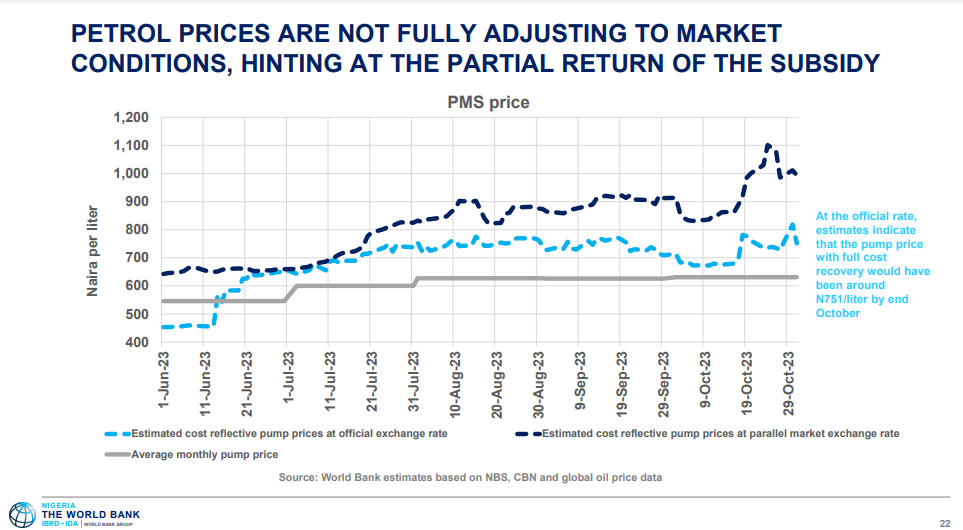On Wednesday, 13 December, Alex Sienaertt, the World Bank’s lead economist for Nigeria, advised the Federal Government (FG) to increase pump prices from its current N650 to N750. The World Bank official suggested that current petrol prices in Nigeria may not fully align with market conditions as the observed prices deviate from what is expected based on the cost-reflective price calculated with official exchange rates.
Sienaertt made this recommendation during his presentation of the Nigeria Development Update (NDU), December 2023 Edition. From the fiscal perspective, the NDU report noted that increasing fuel prices to N750 would help the country sustain the savings from its PMS subsidy reform. “It is important that the subsidy is not reinstated, and that continued progress is made to ensure market-reflecting pricing,” the report said. There have been wild speculations that the government of President Ahmed Bola Tinubu still pays for the fuel subsidy that was halted in May. But the government has debunked such rumours.

As usual, the World Bank’s recommendation did not sit well with Nigerians as citizens already struggle to survive in an economy with surging inflation. In November 2023, the headline inflation rate increased to 28.20% relative to the October 2023 headline inflation rate which was 27.33%. While increasing fuel prices in Nigeria may have short-term challenges and negative effects on certain sectors of the economy and citizens, there are potential positive long-term impacts. However, the overall impact depends on various factors, including how the government manages the situation and implements complementary policies.
The long-term prospects of increasing oil prices in Nigeria
Elevated fuel prices can prompt the government to foster economic diversification through strategic investments in alternative energy sources and non-oil sectors. This would foster a climate conducive to investments in renewable energies such as solar, wind, and hydroelectric power. Consequently, this would catalyse the widespread adoption of sustainable, energy-efficient technologies and practices, thereby contributing to the development of a more sustainable energy consumption pattern. Eventually, this transformative shift has the potential to cultivate a resilient and well-balanced economy, diminishing reliance on oil revenue and mitigating vulnerability to fluctuations in global oil prices.
Increased pump prices may prompt the government to gradually phase out fuel subsidies, enabling a long-term landscape for robust infrastructure development. The potential surge in revenue from heightened fuel prices could be strategically channelled into key infrastructure projects like good roads, public transportation, and healthcare. This targeted investment in critical infrastructure can elevate overall economic productivity and improve competitiveness on a national scale.
Furthermore, as essential social amenities experience targeted improvements, a significant shift in citizens’ behaviour is expected. Elevated fuel prices and enhanced public services are likely to steer people toward the use of public transportation, carpooling, and the adoption of more fuel-efficient vehicles instead of driving their vehicles. This collective shift not only addresses the challenges posed by increased fuel prices but also promises to mitigate issues such as traffic congestion, air pollution, and greenhouse gas emissions. In effect, this holistic approach contributes substantively to the reduction of Nigeria’s carbon footprint, aligning the nation with sustainable and environmentally conscious practices.
Finally, raising Nigeria’s pump prices to N750 has the potential to spark innovation among private enterprises and visionaries. Private players and young people are more likely to create solutions to improve living standards. This innovative drive may culminate in the evolution and widespread embrace of cleaner, more sustainable energy alternatives, marking a transformative leap towards a greener and environmentally conscious future.


